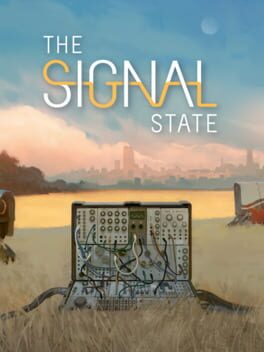

Set in a post-apocalyptic future, The Signal State puts your logic skills to the test with complex puzzles inspired by modular synthesizers. Repair machines, rebuild an abandoned farm, and be part of a revolution that will change the fate of agriculture once and for all.
Reviews View More
The Signal State takes a similar approach to the Zachtronic programming games by trying to make a game out of modular synthesis. While it almost hits the mark, it sadly goes to show what a delicate balance there is between maths themed games, and game themed maths.
The strongest element here is simply the visual design as all the modules, cables, and UI look crisp and how everything interacts make sense. From a technical perspective the implementation of the modules and how everything works is very impressive. The Jakub Różalski inspired art is nice and gives the little story there is some substance. The music is fine background noise too, but the story itself and dialogue didn't work for me. Characters have little to no flavour and the scenario feels overly contrived for an excuse to play with modular synthesis.
As for the gameplay it's a strong effort and I can see how people enjoy it, but I feel it suffers a lot of fundamental game design miss-steps. Starting out by explaining the basic flow of signal with the example of 'B, A, C' rather than left to right as 'A, B, C' isn't a big deal, you get what's intended, but that lack of clarity is everywhere. It stood out to me more when the objective text uses language that doesn't match the descriptions of modules and how they work which confuses things in a game already dealing with some heady subject matter. The objectives are also stated in incredibly technical language which gets very confusing without breaking it down on paper into more natural language (even then some are worded quite poorly).
After 15 levels I was still encountering tutorials because the game also has a very atomised approach to concepts. Normally puzzle games introduce a mechanic, iterate on it, and combine past mechanics to build on your knowledge. Here however you get the module tutorial, then a final exam, and then on to the next one. There's little to no pacing or knowledge building so you always feel on the back pedal and what you did learn doesn't feel like it naturally comes up again because you had to make such a big leap to even 'learn' the new concept. It doesn't let you repeat the work to cement the understanding.
In conclusion, this is a game where if you take away the theme you're just left with a series of maths problems. I've used Reason enough to know this game could be more entertaining if it was centred around euro-racks and producing music - that is to say producing sounds rather than just calculating numeric results. For people who are into maths games this is absolutely going to still be enjoyable, if you're into modular synthesis it will teach you real valuable knowledge, but if you're looking for a game you should be aware that this leans more into lessons than levels.
The strongest element here is simply the visual design as all the modules, cables, and UI look crisp and how everything interacts make sense. From a technical perspective the implementation of the modules and how everything works is very impressive. The Jakub Różalski inspired art is nice and gives the little story there is some substance. The music is fine background noise too, but the story itself and dialogue didn't work for me. Characters have little to no flavour and the scenario feels overly contrived for an excuse to play with modular synthesis.
As for the gameplay it's a strong effort and I can see how people enjoy it, but I feel it suffers a lot of fundamental game design miss-steps. Starting out by explaining the basic flow of signal with the example of 'B, A, C' rather than left to right as 'A, B, C' isn't a big deal, you get what's intended, but that lack of clarity is everywhere. It stood out to me more when the objective text uses language that doesn't match the descriptions of modules and how they work which confuses things in a game already dealing with some heady subject matter. The objectives are also stated in incredibly technical language which gets very confusing without breaking it down on paper into more natural language (even then some are worded quite poorly).
After 15 levels I was still encountering tutorials because the game also has a very atomised approach to concepts. Normally puzzle games introduce a mechanic, iterate on it, and combine past mechanics to build on your knowledge. Here however you get the module tutorial, then a final exam, and then on to the next one. There's little to no pacing or knowledge building so you always feel on the back pedal and what you did learn doesn't feel like it naturally comes up again because you had to make such a big leap to even 'learn' the new concept. It doesn't let you repeat the work to cement the understanding.
In conclusion, this is a game where if you take away the theme you're just left with a series of maths problems. I've used Reason enough to know this game could be more entertaining if it was centred around euro-racks and producing music - that is to say producing sounds rather than just calculating numeric results. For people who are into maths games this is absolutely going to still be enjoyable, if you're into modular synthesis it will teach you real valuable knowledge, but if you're looking for a game you should be aware that this leans more into lessons than levels.
